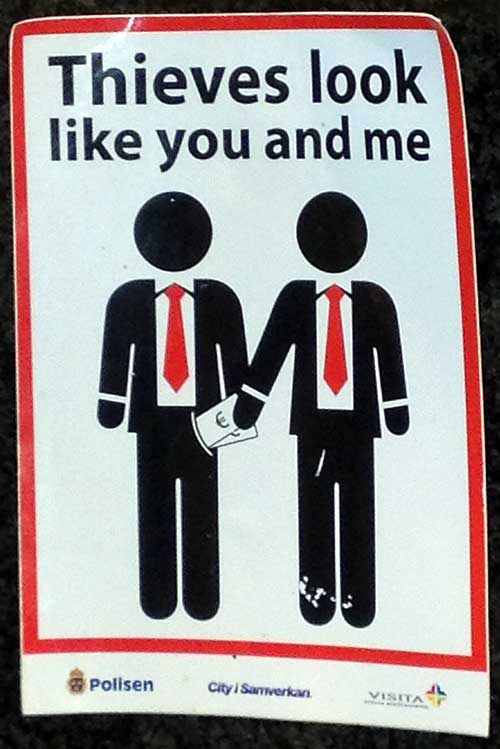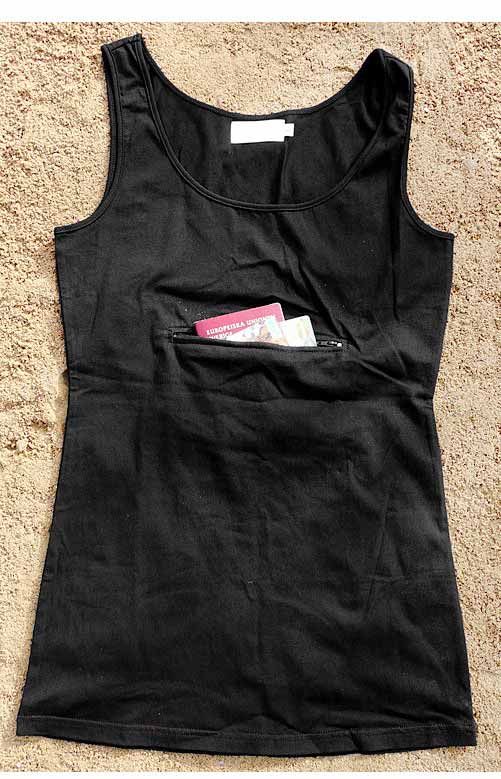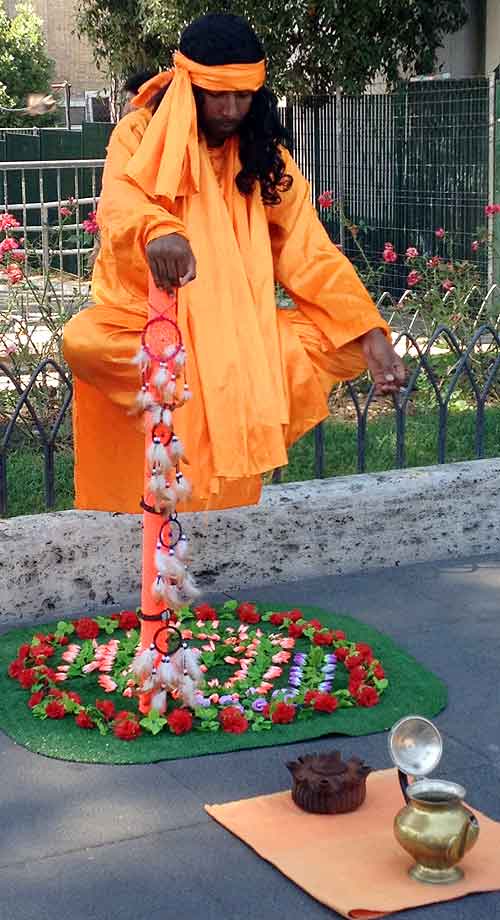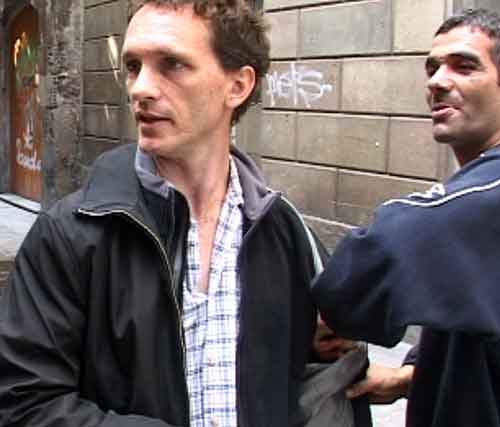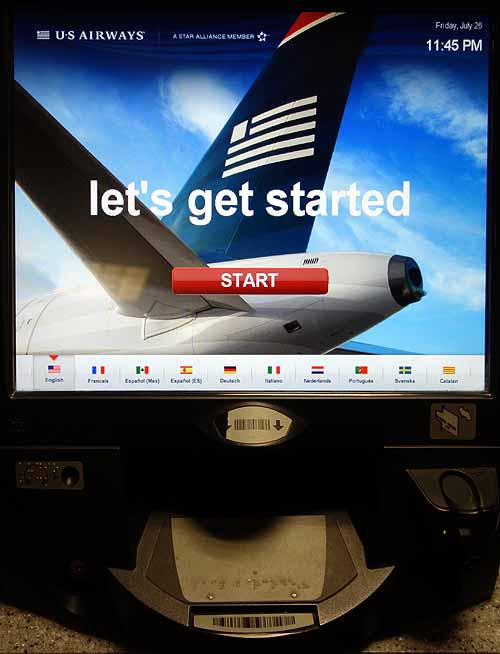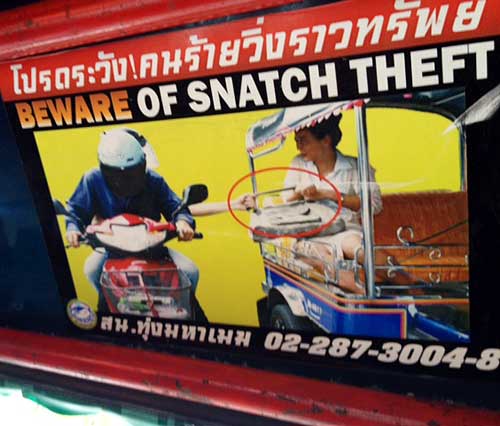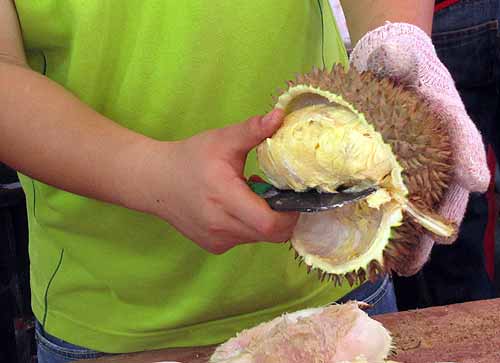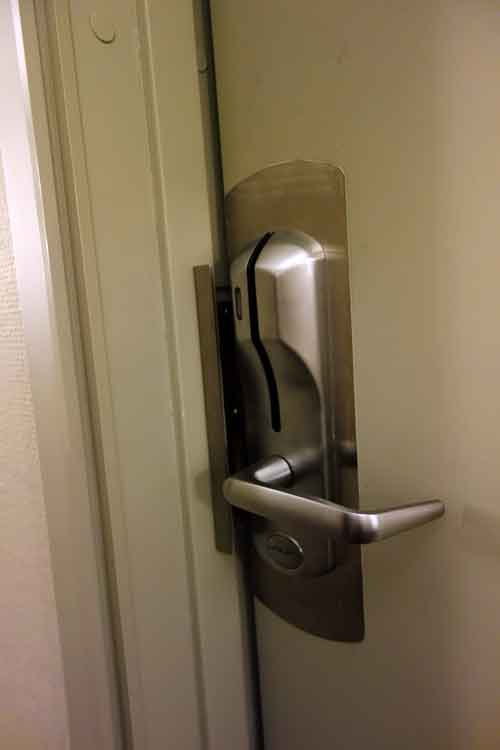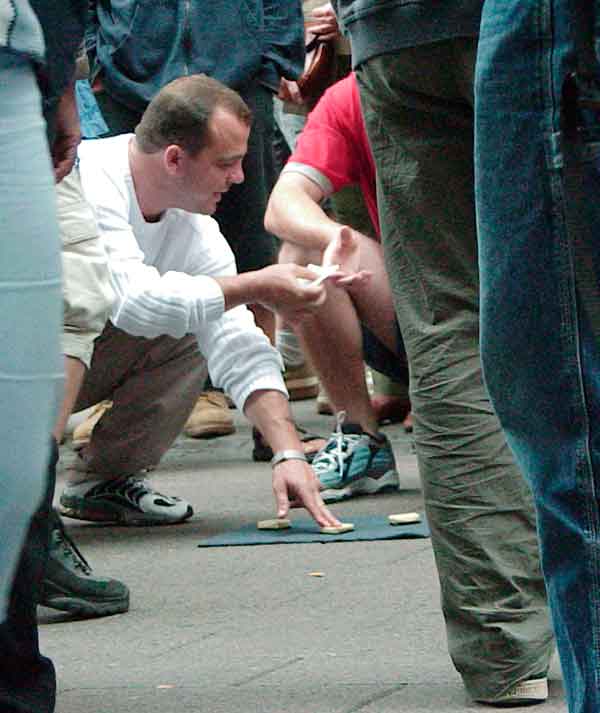Pickpocket-proof clothes
Pickpocket-proof clothes. The pros discuss the pros. There aren’t too many cons, except for those we foil wearing pickpocket-proof clothes.
Continue readingLiving statue street performers levitate
Living statue street performers
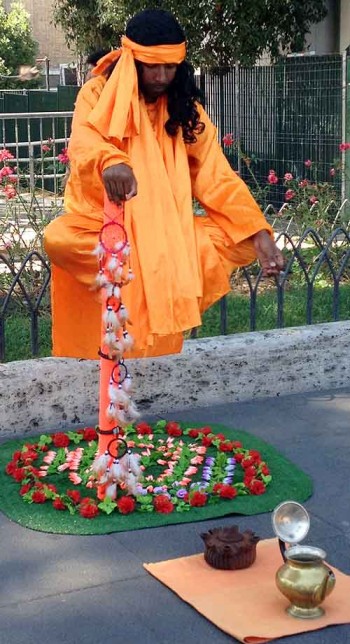
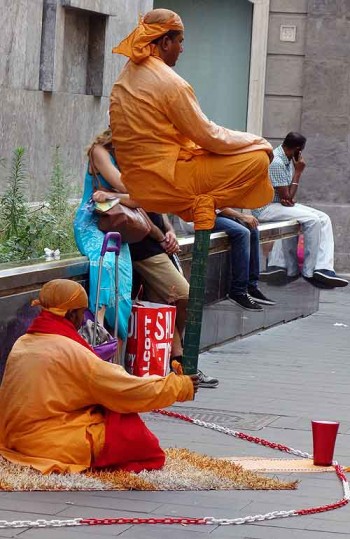
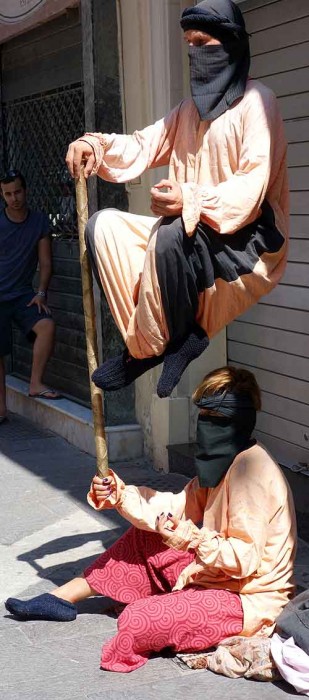
Living statue street performers in Europe have learned a new trick. Now they levitate.
I’ve seen these floating swamis in several cities this month, all sporting minor variations on the theme. My favorite is the solo act I saw on a sidewalk in Rome. Unfortunately, there were three versions of the act in a row, which takes away a little of the surprise and mystery.
Aside from the lone meditating man in Rome, all the others I saw were duos—still a great effect.
And here’s what I really liked. The actors, and their assistants if they had them, hid their set-up. One morning, I saw a giant gray tent-like cover, billowing in the breeze on a sidewalk, as some mysterious activity took place within it. Though I enjoy watching the better living statues apply their makeup and don their costumes, I would not like to observe the secrets of this effect being revealed. It pleases me that the actors bother to prevent exposure.
How have the cities so suddenly become flooded with floating swamis? Is there one magician somewhere who sells or rents the gear? Does he own the franchise? Or did one clever living statue street performer take his act public, only to see a rush of copycats proliferate all across Europe?
At least one of these groups is from Bangladesh. Perhaps they all are. I didn’t have a chance to ask if they all descend from a single purveyor. Only one group I saw had a guard-assistant-controller nearby, with whom I could speak.
In general across Europe, the quality of living statue street performers has come down. I can be impressed with the creativity of some: their concepts, costumes, stillness, face expressions, and movements to reward a coin donation. But just as often now, they’re disappointing. Boring, with their faces covered by commercial masks, allowing them to lick their lips and twitch and scowl to their hearts’ content. So many now are cheap copies hopping on a bandwagon. If you’re going to be still—and do nothing—you better be really something to look at.
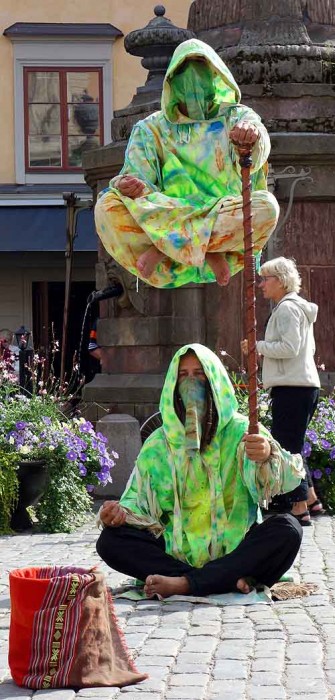
How pickpockets steal from inside jacket pockets
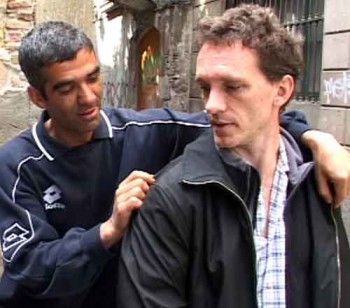
How pickpockets steal from inside jacket pockets usually involves the application of something disgusting, much like the pigeon poop pickpocket does. Occasionally, they use a baby—not to apply the gunk, but to stick its little hand into the male victim’s breast pocket.
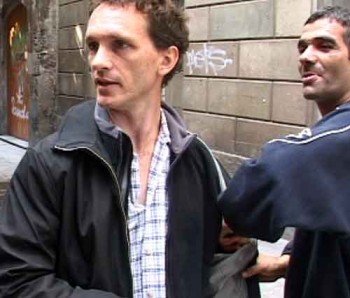
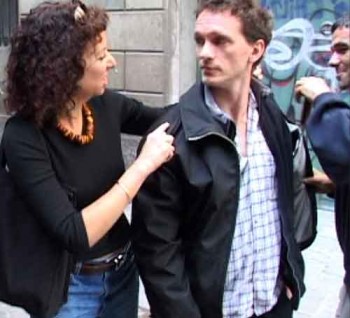
A man’s inside breast pocket is one of the safest from pickpockets. It’s one of the hardest pockets to steal from because it’s in front, up close, in a sensitive area. Unless, of course, the jacket is hanging on the back of a chair—then it’s a piece of cake.
Clever strategist pickpockets tap directly into their victims’ emotions, the hard-wired ick factor being a useful one. Bob Arno described how, as a youth, he was “stunned at the callousness of using the primeval emotion, fear, to accomplish distraction”:
“In the early sixties leprosy was still a serious threat to the populations of India and Pakistan. It was common to see sufferers in various stages of deterioration roaming the streets of Karachi, Calcutta, Bombay, and New Delhi. Banding together, they often surrounded Western visitors coming out of banks, hotels, and churches. The sight of an outstretched hand with missing or rotting fingers usually caused people to react with horror and drop some coins, if for no other reason to get the infected limbs to go away. Compassion and revulsion metamorphosed into currency. The ploy was effective, diabolical, and unique to Pakistan and the Indian subcontinent.”
This daring face-to-face technique used to steal from inside jacket pockets, no matter how brief and fleeting, is not for every thief. It takes a certain coolness to step up to your potential victim, show him a close-up of your face, and slide your hands all over his body, like a tailor. The pickpocket keeps track of multiple streams: he’s eliciting the ick factor, acting the good Samaritan, and setting up a stealthy steal literally right under the vic’s nose. He’s probably watching out for police and witnesses at the same time. He’s probably sweating.
It doesn’t always work:
Indian Shit Trick
“We were about to cross the street in Delhi,” a British traveler told me. “It was very crowded, people pushing and going in every direction. We stepped off the curb between some parked cars which were very close together. I was just concentrating on getting through them and across the street. A man bumped into my husband as we were squeezing between the cars. He followed as we crossed the street, and as we reached the other side, he pointed to my husband’s shoe. ‘Shit,’ he said. We looked down and saw it. It was shit on my husband’s shoe. The man offered to help us clean it off, but we thought we knew what he was up to. We thought it was a scam. We’d heard that they do that, then demand huge sums of money in payment, and they don’t let you go until you pay. So we said no, and walked away with shit on the shoe.”
How pickpockets steal from inside jacket pockets
Of course [the prolific and multi-talented Barcelona pickpocket] Kharem has a version of this one. He had led us into a seedy alley, long, dim, and deserted, eager to demo, at Bob’s request, his expertise on inside jacket pockets.
“I don’t want to go much further in this direction,” I said, chicken as usual.
“Don’t worry,” our interpreter soothed me. “I know where we are.” That was Terry Jones, our Barcelona-based friend and bag-snatch authority.
Kharem stopped at a graffitied niche where a stone water fountain was the sole feature.
The only jacket among the four of us on this warm spring afternoon was Kharem’s prop, the “tool” he used over his arm. He put the jacket on Terry and took a fat brown wallet from his own pocket.
“Whose is that?” I asked him.
“Mine!” he laughed, and put it in Terry’s inside breast pocket. I should have asked whose was it.
“Wait till these people pass.” A couple ambled toward us, oblivious to all but themselves.
“Shall I do it on those tourists?” Kharem asked.
“Noooo, we’ll wait,” Bob said, and the rest of us laughed nervously.
“It takes two people,” Kharem explained. “One spits into his hand, then applies the spit onto the victim’s right shoulder.” Standing behind Terry, he showed how to “help” the victim by pointing out the mess. After indicating the shoulder to Terry, who couldn’t see that far behind him, Kharem grasped the upper right sleeve with his right hand and Terry’s left lapel with his left. With both hands, he twisted the jacket slightly around to the right.
This accomplished two necessities. It successfully turned Terry’s attention far to his right, and it intentionally made vulnerable Terry’s left inside breast pocket. With perfect timing, the “pick” of the pair, approaching from the front, would then have free access to the wallet.
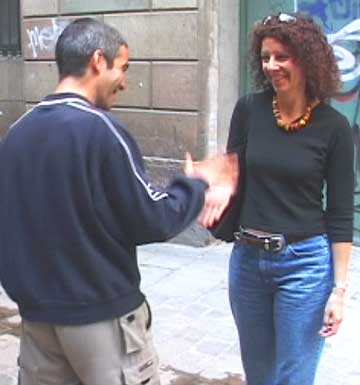
Kharem suggested I be the spitting Samaritan and, as Bob filmed and Terry cooperated, we easily stole the wallet. Kharem high-fived his new partner.
“Eeew,” I said, pulling my hand away. His was wet.
“It’s not spit!” he said. “It’s from the water fountain!” I hadn’t noticed that he’d gotten a quick drink.
Spit, shit, what’s the difference? The object is to apply a substance that the victim wants off now. Something disgusting, something staining, something smelly. In New York they use mustard. In London ice cream. Mix and match. The strategist has created his opportunity complete with an excuse to get up close and personal…to touch…to take.
Adapted from Travel Advisory: How to Avoid Thefts, Cons, and Street Scams
Chapter Seven: Scams—By the Devious Strategist
Airline seat scam at U.S. Airways
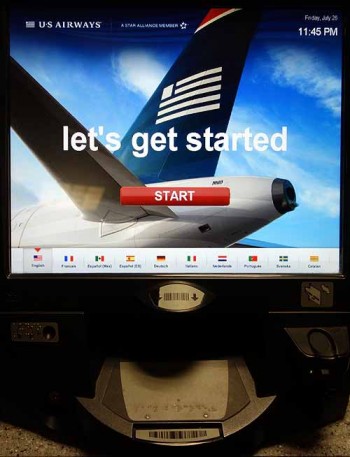
I’m ready for lousy treatment from airlines. I expect it. Even from U.S. Airways, a member of the Star Alliance, of which I’m a top-tier member (“gold”).
U.S. Airways doesn’t extend any special privilege to me when it comes to economy seating, since my Star Alliance allegiance is to United Airlines, where I am a 1K member.
So I expect rotten seats. I get the best I can early, then hope some improvement can be made at check-in. So much for being Star Alliance Gold, the valued frequent-flier.
I followed that practice on our most recent domestic flight. Our client booked Bob and me on separate reservations with seats together in the back. Online, I moved our seats forward to 17A and B.
Airline seat scam
Early to the airport for our red-eye, there was no crowd and a nice agent quickly volunteered to assist. At the passenger check-in terminal, he brought up the seat map on which we saw certain desirable seats marked with dollar signs. I won’t pay for those on principle. The agent pointed out 5A and B on the screen, which showed available, no extra charge. Great. He booked me into 5A, a window seat.
The agent then logged in for Bob’s reservation and clicked to the seat map. 5A showed occupied now—by me. But 5B, a middle seat, was now marked with a dollar sign. It suddenly required an extra charge!

“What happened?” I asked, “it was free just a moment ago. And who charges for middle seats?”
“They charge if you want to sit together,” the agent said. Another agent volunteered that “the system” charges for random seats. But what passenger would pay for a middle seat? Only one who wants to sit next to someone sitting in the adjacent seat, obviously. Not very random, it seems to me. Clearly, an airline seat scam by U.S. Airways.
“Forget it! Just put us back in 17A and B, then.”
The agent fiddled at his own terminal for a few minutes, then informed us that 17A and B were no longer available. He offered something in the 30s.
Bob and I balked, insisting that the agent put us into 5A and B, as he initially suggested, or restore the seats I had reserved online. I waved my printed reservation at him, and he bothered to scrutinize it. We used the words airline seat scam and requested a supervisor.
The agent sweated at his terminal. Magically, 17A and B became available once again. The agent said he “moved someone.” Who knows how these airline seat scams work. Did someone really grab 17A and B during the very few minutes we tried to switch to seats in row 5? Did the agent hit a red “pax balks” button?
So now I’m wondering what triggered the scam, given that Bob and I had separate booking numbers. Could it be that his and my profiles, or frequent flier numbers, show that we usually fly together? Could it be that we booked a window seat, and within two minutes attempted to book the adjacent seat from the same terminal? Could it have been triggered by the agent who volunteered to take over the process? Any of these are possible. Any other instigator I haven’t thought of?
One thing I do not believe is that the seat we wanted was suddenly a “random” charge.
We haven’t experienced everything as very frequent fliers, but we thought we’d at least read everything. This was a first. Charging to sit next to someone? Charging for a middle seat? This is an airline seat scam I hadn’t read of, heard of, or could imagine. Very creative, U.S. Airways!
Hotel oddity #38

Here’s another hotel oddity. The Marine Plaza Hotel in Mumbai got it a little wrong. The nice fabric shower curtain is on the inside, and gets soaked. The clear plastic curtain liner hangs on the outside.
Is there some logic I’m not getting? Are all the bathrooms done like this?
I’m not complaining—the hotel was otherwise nice enough. Just… the odd things I find in hotels! It never ceases to amuse me.

Bangkok theft from tuk-tuk passengers
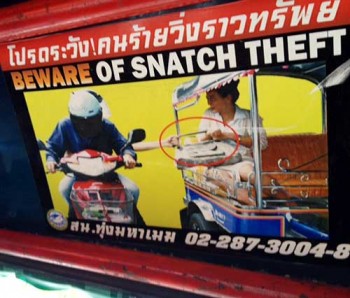
Bangkok theft has gotten bad enough that police have posted warnings about theft from tuk-tuk passengers. The convenient little auto-rickshaws, ubiquitous on the streets of Bangkok, are completely open and often stuck in traffic. Scooters can maneuver the interstices of clogged roads, sneak up on tuk-tuk passenger, then slither away between vehicles to beat an escape.
It’s a technique long in play in Italy, especially in Naples. There, targets of scippatori, the Italian version of scooter-riding bandits, are more often pedestrians. (Though the thieves have a nasty technique for stealing watches from expensive cars stuck in traffic, even with their windows closed.)
When riding in the three-wheeled open taxis, be sure to keep your bags secured, out-of-sight, or away from the perimeters.
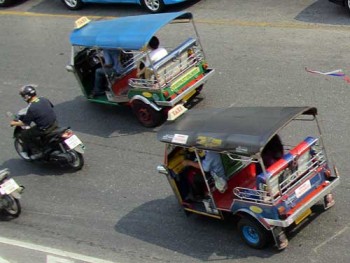
Bangkok theft extends beyond pickpocketing and bag snatching to scams that cost the tourist serious money. Particularly prevalent are gem scams, in which the visitor is brought to a “special sale” and encouraged to buy gems for resale at huge profits in their home countries. And bar scams, and vehicle-rental scams, drink-drugging, and pseudo-cops.
Then there’s the awful shoplifting-set-up scam at Bangkok’s airport, about which I’ve already written.
As if all these Bangkok theft issues weren’t enough for a tourist to worry about, there’s more. Road safety is one of the worst in the world, with poor vehicle and driver safety standards, little if any enforcement, few ambulances, and roads too clogged for ambulances to get through anyway. Add to that wild motorcycle riders attempting to speed around traffic by veering suddenly onto sidewalks, and even pedestrians must be seriously watchful.
I strongly recommend that travelers planning to visit Thailand read the U.S. State Department’s Country Specific Information on Thailand. Like all U.S. State Department country profiles, it covers very real ongoing crime and safety issues without exaggeration.
Durian, the fragrant/foul fruit
Durian.
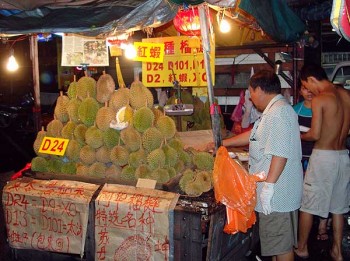
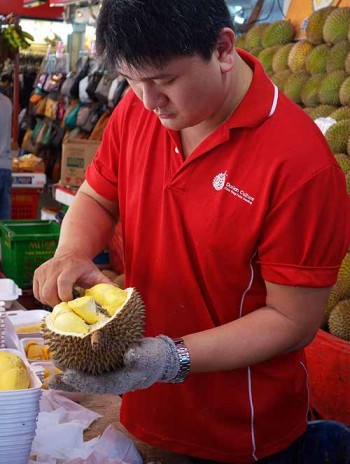
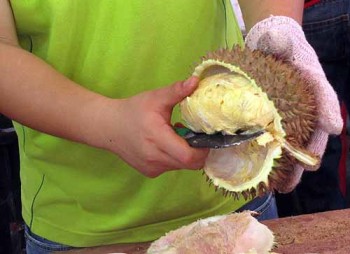
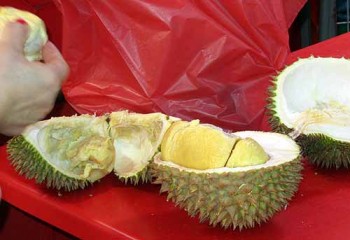
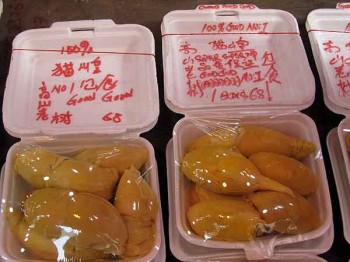
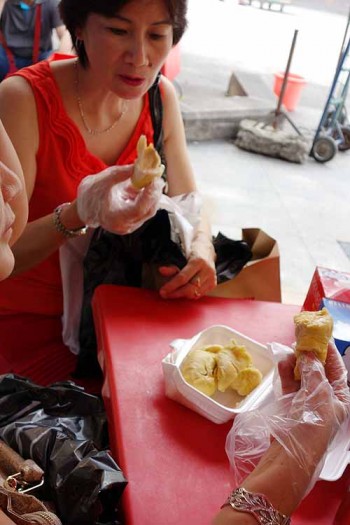

You love it. You hate it. Or you’ve never had it. This powerfully-fragrant fruit from Southeast Asia is considered so foul-smelling by some people, they say they hate it even though they can’t bring themselves to taste it.
All I can say is: poor them. I’m obviously in the love-it camp. I can smell it from blocks away and am magnetically drawn to the stand like a bee to honey or a fly to… well, I’ll leave the similes to you.
Durian flesh is intensely sweet but at the same time, delicately flavored. Its creamy-custardy consistency can be firm to soft, and has a silky texture. Surely one of nature’s strangest inventions, its surprising, delicious interior is protected by multiple barriers. If its odor doesn’t put you off, its dangerous thorns might. And how do you crack the thing, anyway. All messages are: stay away!
Unless the fragrance entices…
The football-shaped durian has a thick spiked shell. If it weren’t so heavy, it would be a formidable weapon. Durian professionals wear an armored glove on one hand, and wield an evil-looking knife or cleaver in the other. The soft interior segments are gently prized out and arranged in a styrofoam box, where they look not unlike an undercooked omelet, or piece of raw chicken fat. Ready-to-eat durian will not win a beauty contest no matter who are the other contestants in the fruit-world. It beckons with its fragrance. By necessity, it must. A feast for the eyes, it isn’t.
I don’t know the qualifications the durian man uses to grade his fruit, especially without tasting it. Maybe they’re meant to remain a mystery. But wherever durian is sold, a range of qualities is on display. The priciest are often noted with a number of exclamation points: “best quality!!!” I’ve seen styrofoam boxes of durian ranging from about $3 to over $60. Locals scrutinize the offerings with serious concentration and buy the best they can afford.
Other durian stands sell the whole, uncut fruit. How does the buyer choose? Locals I have dined on durian with answer ambiguously.
Ladies-who-lunch and professional women visit the durian man in small groups. After selecting, they take their box to a plastic table, pull disposable gloves over their nails and jewelry, and dig in with their hands. I like the dichotomy: these elegant women visit their local supplier to quell a craving, get a quick and messy fix, then peel off the gloves, pop a breath mint, and slip back into society. The aroma will stick to them like illicit cigarette smoke.
Before I knew better, I bought durian and tried to take it home on a bus. This was in Singapore. It only took a few minutes before the bus stopped and I was ejected with my plastic bag. A taxi grudgingly drove me, but only with all its windows open despite the high temperature and humidity.
I ate too much durian in Bangkok one time and got what I later learned is called “hot tummy.” I felt light-headed, too, and had to take a tuk-tuk back to the hotel. Bangkok traffic is legendary—not even a little tuk-tuk can move quickly through it. The carbon monoxide fumes made me feel even sicker, but by the time I got back to the hotel, my hot tummy had cooled.
It seems you can now get durian in New York City, though I wonder how fresh they are. What is the shelf-life of an unfrozen durian? They’ve got to be frozen. If the NYC supply has been frozen, I’d stay away. They’d certainly not be suitable for a first introduction.
In Southeast Asia, when fresh ones are not available, I’m very happy with a durian shake. Durian cakes and custards are okay. Nothing beats the iced malaysian dessert durian chendol. I dream about it.
Hotel security: room door left open by housekeeping
A lightning bolt of fear shoots down your spine when, returning late to your hotel room, you see the door is not fully closed. You know you closed it—and checked it.
Pushing the door a little you see that, not only is the door open a crack, but its bolt is thrown so that it can’t close.
This is what happened to my sisters at the Hotel Mercure in a Stockholm suburb. Luckily, it wasn’t the same day that they accidentally left their smartphone on the bed. (The phone was still there when they returned late that day.)
After the physical attributes of a hotel room, housekeeping holds our security in its hands. We can perform our hotel room security check and follow good security practices, but the maids can make our efforts moot.
A traditional hotel security threat has come from social-engineering burglars who enter rooms while maids are cleaning them and pretend to be the room’s occupant. To behave appropriately in these confrontations, hotel housekeeping staff must rely on their training, perhaps balanced by their own judgment and discretion. And anyway, rules are one thing; compliance is another.
Human error is a separate factor. How many times has that housekeeper finished a room, unbolted the door, closed up, and ticked it off her clipboard? Or, oops! Out of shampoo—she’ll just fetch it in a moment…
Mercure hotel management did not seem overly concerned by the security lapse. In compensation, my sisters were offered “a small dessert” at the lobby restaurant. The attitude, apparently, was that if they weren’t claiming a loss of property, well, no harm done!
I usually forsake maid service, leaving the “do not disturb” sign on the door. If you like your room tidied up (and even if you don’t), this is yet another argument for locking up your valuables, either in the safe or in your largest luggage.
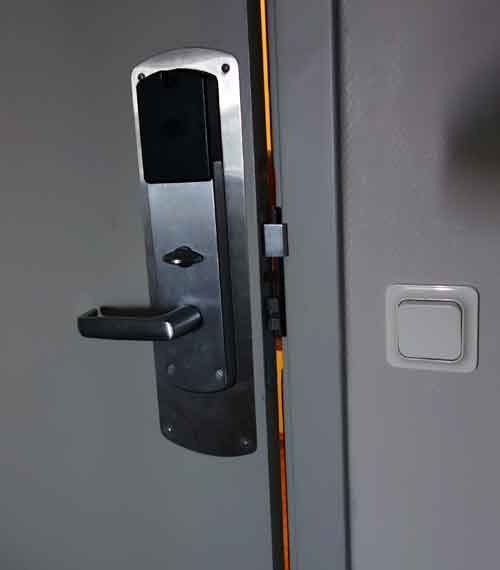
The three-shell game – part 3
The Pea Game
Shills and Shells
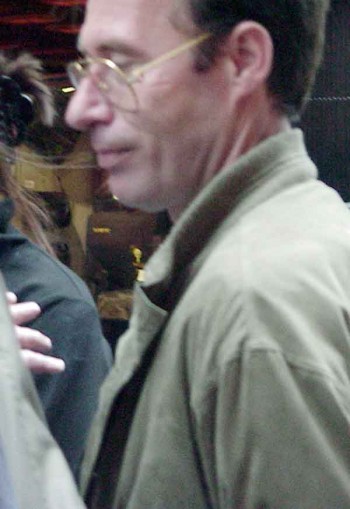
“It’s the talk that’s important,” Serge insisted, about the pea game. Each forceful word sent a curl of smoke into his own eyes. “Not the hands. The skill is the talk.” His fingers idly spun and twirled a matchbox as he spoke. “Why you want to know this? Why you ask me?”
Because we’d watched him work the crowds earlier in the day, watched him cheat a steady stream of happy-go-lucky vacationers. Because we’d watched his team of almost a dozen men take in bets of $3 minimum, up to $75, and no one ever won. And because we hadn’t expected this opportunity, this impromptu interview with an eminent operator.
It was past 10 p.m. when Bob and I began our stroll up Copenhagen’s Vesterbrogade, away from Tivoli, away from the maddening throngs of holiday-makers, away from the Swedes who swarm over by ferry or the new bridge for a night of cheap beer. The wide avenue got darker and quieter as we walked west, the shops more utilitarian and drab.
As we approached and passed a small restaurant, a diner at an outside table leered at me, swinging his huge head like a dashboard-dog’s as I passed. His lewd look was piercing enough that I turned back, only to see the man’s head swiveled backwards on his shoulders, eyes still fixed on me.
“I’ve got to go talk to him,” Bob said abruptly. Strange: I could have sworn he hadn’t noticed the man’s stare; neither is Bob the type to challenge a man for a glance. Feeling hostile and squeamish, I hung back, concealed and feeling protected by a sidewalk sign.
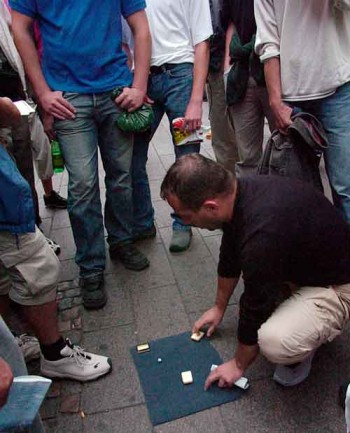
Bob was smiling! I crept a little closer. Speaking in German. I made out a bit of it. Bob was asking the man about immigration policies in Denmark, but I hadn’t the faintest idea why. They spoke for several minutes before Bob rejoined me.
“Who is he?” I asked, half mad, half curious.
“One of the three-shell guys we saw today.”
“You’re kidding, a pea game guy! Did you ask him about it?”
“No, I just asked him about immigration. He’s from Kosovo.”
“But let’s go back and ask him about the pea game!” I said, going from zero to zeal in an instant. “What luck!”
We returned to the con man and his partner as they sat before empty dinner plates, each enjoying beers and cigarettes. The big head swung around to look me up and down, unapologetically. Perhaps it was second nature for him to appraise his opponents.
“Serge” was reluctant to spill his guts to strangers. It took considerable chit-chat before he warmed to us even a bit. Our conversation shifted back and forth between elementary English and rudimentary German.
Gently, we hinted that we’d seen him in Strøget, the pedestrian shopping street, that afternoon. He looked from me to Bob, questioningly. Yes, we’d seen him doing the three-shell game; he appeared to be quite proficient. We saw him take in large sums.
Serge smiled nervously, trapped in his seat as Bob and I stood at the edge of his table. His younger partner sat silently, lacking English and German.
“I make the game also,” Bob confided, “but only on stage. I’m a magician.”
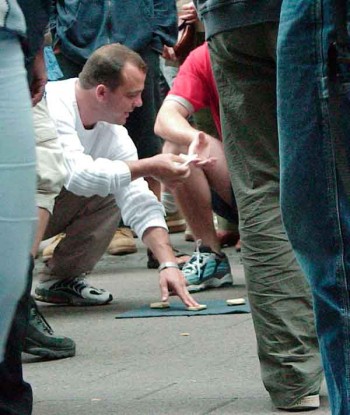
Serge visibly relaxed a notch. He balanced his cigarette pack on its corner and spun it under a fingertip, considering.
“There is not trick,” he tried, “just talk and fun.”
“I know the game. I’m interested in you. How many in your team?”
“Eight. Sometimes ten. Many men to share money.”
Serge had been operating the three-shell game for twenty years. First in his native Kosovo, then in Germany for six years, and finally in Copenhagen. Having fled the war in Yugoslavia, he had no papers in Denmark, he told us. What else could he do? How could he earn money?
“This job,” he said, “it is just to make fun for the tourists.” Palms up, fingers spread, shoulders hunched. “People see that it’s easy to win; they want to play.”
This is Part 3.
Read Part 1.
Excerpt from Travel Advisory: How to Avoid Thefts, Cons, and Street Scams
Chapter Eight: Con Artists and their Games of No Chance

